- Home
- Francine Mathews
Jack 1939 Page 2
Jack 1939 Read online
Page 2
“Thanks.” He thought about tipping the guy, but before he could find a quarter in his pants pocket, a hand came down on his shoulder. A surprisingly heavy hand. Like a cop’s.
“Mr. Kennedy?”
He turned around. “Yes?”
There were three of them—Foscarello, Casey, and Schwartz, as he would learn later. They wore trench coats and snap-brim fedoras, and although they bore no relation to one another, their faces had a blunt-featured sameness. Schwartz was in charge of this cutting-out expedition and it was he who’d clapped his hand on Jack’s shoulder. He was four inches shorter than Jack but his hips and chest had the centered mass of a wrestler.
Jack could feel the doorman watching him; he saw the bellboy halt in his tracks. And so he flashed his smile at the men who were not cops, and said, “Gentlemen. What can I do for you?”
* * *
THE MAN IN THE WHEELCHAIR couldn’t sleep, but that was nothing new. Because his days were filled with too much talk and competing bids for attention, he’d made a habit of insomnia; he thought more clearly in the emptiness of midnight. Four hours of peace were his as the train rolled north from Washington, and he’d spent some of it reading the manila file that Ed Hoover had sent over from the Bureau that morning. When his eyes grew tired, he stared blankly at the protective steel louvers that striped his private Pullman’s windows, thinking. He was pulled up in the lee of a desk bolted to the train car’s floor. It was covered with cables from Europe.
He had owned this job for nearly eight years now, and the insomnia was building with the threat of war, a continuous adrenaline feed into his bloodstream. It was sapping his strength and his life, but he could no more give it up—this excitement like a second pulse throbbing beneath his skin—than he could choose to walk again. He knew, better than any man in America, just how critical the work was and how little time he might have to control it. The work was more vital than legs or sleep or even living a few years longer. It was defining the shape of the coming world—he was defining the shape, he and a few other people on the opposite side of the ocean, and the crooks they tried to contain, and the sheer variability of facts and impulses that collided each day as randomly as a boy’s marbles. He could not sleep because he could not stop watching the world as it gathered itself to explode.
A year ago—1938—Adolf Hitler had seized Austria, although the term he used was “annexed,” without firing a shot. A few months later, he’d screamed for the German slice of Czechoslovakia, the Sudetenland, when what he really wanted was the country’s munitions factories and uranium mines and a clear passage to the Russian border. Neville Chamberlain, the British Prime Minister, had flown to Germany twice to tell Hitler he was welcome to the Czechs, if only he’d leave England alone. Hitler had shaken on the deal and promised to be a good boy. The British public cheered with relief and called Chamberlain a savior.
The man in the wheelchair thought Chamberlain was an egotistical ass.
He squinted through his spectacles at the most recent cable—it was from Poland, the next prize in Hitler’s sights—then set it down in favor of the manila file he’d practically memorized.
Believed to be dying at age seventeen . . . misdiagnosed with leukemia . . . possible blood or liver disease . . . damaged vertebrae while playing football at Harvard . . . spends several weeks each year at the Mayo Clinic, with additional tests at Brigham Hospital . . . medical consensus: unlikely to thrive . . .
A slight sound from the doorway drew his head around; Missy was leaning there, the perfect personal aide, a cup of tea in her hands.
“Like some?” she asked.
“Please.” He took the cup from her, scenting the rum-spiked tea. As he drank, he tapped the manila file. “Ever meet this boy?”
She shook her head.
“Supposed to be a charmer.” Roosevelt peered at her over his spectacles. “The Black Sheep of the family. Hang around and say hello, if you want.”
Missy had a soft spot for black sheep. She came over to his chair and planted a kiss on his head. “My book’s too good.”
He eyed her critically. His wife would be reading an improving work filled with labor statistics. But Missy . . . “Is it something by Jane Austen?”
“Dashiell Hammett. Tell me about Jack in the morning.”
* * *
THEY LED HIM THROUGH a part of the Waldorf few guests ever saw and exited a service door into the hotel garage, pulling up eventually before a freight elevator. By this time Schwartz had flipped open his badge.
“Secret Service,” Jack mused. The Treasury department’s special force. Which might mean he’d been dragged out of the lobby because Dad had overplayed the markets again. Why not talk to his father, then? Why buttonhole Jack? It was important, he figured, to look unconcerned. To stay calm, even if his heart was racing. His eyes met Schwartz’s and held them.
“Is my father in some kind of trouble?”
He didn’t need to remind the Secret Service that Joe Kennedy had made a fortune manipulating stock in ways the Treasury department had never been able to prosecute. Franklin Roosevelt had made Jack’s father his first chairman of the Securities and Exchange Commission as a reward for his cunning. Set a thief to catch a thief, Roosevelt had said—or so Dad once told Jack, smiling his thin smile at the head of the dinner table. Dad found the President’s cynicism funny. How could Treasury have caught up with Joe Kennedy now?
“Last I heard,” the man named Foscarello said, “your old man was just swell. Out dancing with a hatcheck girl.”
Jack flushed and almost went for Foscarello, but at that moment the doors of the freight elevator opened and Schwartz’s hand was on his shoulder again, guiding him into the steel cage.
“Mr. Kennedy,” Schwartz said soothingly, “we’re President Roosevelt’s bodyguards. He wants to see you. He’s waiting below in his Pullman.”
Foscarello stared at Jack without blinking and there was a definite challenge in the man’s stolid face. The elevator lurched like a tin can on a string and Jack’s stomach dropped sickly.
“Below?” he repeated. “The President’s Pullman is in the hotel’s basement?”
Schwartz sighed. “There’s a track beneath us, Mr. Kennedy. The Waldorf was built over some old train yards connected to Grand Central. Platform 61 belongs to the hotel. Public trains don’t stop here—you can’t actually find the platform unless you know where to look. The President uses it on his way to Hyde Park.”
Jack ran a hand tentatively over his hair. “You’re sure Mr. Roosevelt didn’t ask for Joe Kennedy?”
“He asked for Jack.”
“How’d he know I’d be here tonight?”
Schwartz almost smiled. “I have no idea, Mr. Kennedy.”
The elevator doors opened.
“Hey,” Jack said urgently. “Anybody got a comb?”
* * *
ROOSEVELT WAS PRETENDING to read the file when the boy slid through the doorway, ducking his head in deference to the occasion, one finger working at his tie. His clothes were a mess; so was his hair. It was remarkable hair: springy and barely tamed with pomade that’d been applied a day and a half ago. Roosevelt dismissed Schwartz with a nod.
“Ah. Jack. Good of you to come. Sit down, won’t you?”
“Mr. President.”
It was all visitors ever said, as though the title implied whole layers of meaning—I’m honored, I’m bewildered, I’m waiting to find out what I did wrong—and for a moment Roosevelt was disappointed. He’d expected more from the Black Sheep.
“I didn’t exactly have a choice,” Jack went on, with a sudden grin. “Those boys of yours are very persuasive. But I like my nose unbroken. So I came along quietly.”
There it was: The jauntiness. The inveterate curiosity. Roosevelt had guessed right about this one.
Jack sank i
nto one of the Pullman’s seats with unconscious grace. His face was gaunt, his frame as thin as a teenager’s. But Roosevelt caught a whiff of cordite on the air—the scent of a fired gun, a burnt match. It came from the kid in front him. Jack crackled with energy.
J. Edgar Hoover thought the boy was an embarrassment, the expendable Kennedy.
He’s the kind who never finishes anything, the FBI chief had insisted as he’d handed Roosevelt the file that morning. The kid who comes in second, the one who drops out, who trades on his daddy’s name. He was nearly expelled from Choate, for God’s sake, he was such a discipline problem. He quit the London School of Economics. And Princeton.
But Roosevelt never relied on a single source of information. He knew more about Jack than Hoover or his files would ever hold. Jack might be sick and his record might be checkered, but he was one of those rare souls completely at home in the world. It didn’t matter that he was Irish or Catholic or that his father was regarded as an unprincipled cad; Jack slouched into the most breathless of WASP bastions in his careless clothes and threw his legs over armchairs like he’d owned them from birth. His ease was admired and slavishly imitated; his quips and sarcasm circulated like a kissing disease. He was voted into Harvard’s exclusive Spee Club when no Kennedy had ever made a final club at Harvard before—because his friends categorically refused to join without him.
Hoover loved to tick off the ways Jack slid by: the standing account at the Hyannis Port gas station, where the convertible’s tank was always filled and the owner never paid; the clothes strewn all over the floor of his college suite; the string of girls he picked up and dropped. But those things meant nothing to Franklin Roosevelt. He’d been privileged and young once, too. He was much more interested in the ways Jack didn’t conform to type. His love of risk. His analytic brain. His need to argue. His willingness to ditch the pack and go it alone.
His refusal to admit he probably wouldn’t see thirty.
The man in the wheelchair looked at Jack Kennedy, and saw something he recognized. Something he’d learned to respect. Something he was himself.
A survivor.
* * *
“YOU’RE WONDERING WHY you’re here,” the President said.
The smile flashed again. “I told Mr. Schwartz it was probably Dad you wanted to see.”
“I saw your father in Washington. He’s a fine man. I’m proud of the job he’s doing for us over there in London.”
Roosevelt kept his voice light as he mouthed the lies; nobody ever won a boy’s heart by insulting his father. He disliked Joe Kennedy more than most of the men who hung on his coattails; and he’d never trusted him, even when Joe’s money and Democratic contacts had helped win the ’32 election. Roosevelt had sent Joe to London mostly to get him out of his hair. He preferred to leave the Atlantic between them; if Roosevelt had his way, Joe would stay in England until after the 1940 election.
“That’s kind of you to say, sir.” It was the correct response, of course—but Roosevelt saw Jack’s slight frown; he was wary, now. He’d know, of course, that Roosevelt was forcing his father to return to London early—two weeks before Jack sailed—because he was fed up with Kennedy idling by his pool in Palm Beach, with his detective novels and his easy women and his fawning reporters drinking his whiskey, while they assessed Joe’s chances of winning the presidency. Joe Kennedy actually thought he was Roosevelt’s heir apparent. His ambition, Roosevelt thought, was childlike; for a crook he had very little guile. It was as though all his craftiness was reserved for making money. In the game of politics, Roosevelt could run circles around somebody like Joe. Even in a wheelchair.
He took a sip of Missy’s tea. “You know I was a Harvard man, of course.”
“Yes, sir.”
“I put in a call today to Bruce Hopper. I believe you two are acquainted?”
Jack sat up, on alert. “Professor Hopper’s my thesis adviser.”
“He’s a fine man. Fought in the War, you know.”
“Have you heard his Armistice Day lecture?” the boy asked eagerly. “It’s something I’ll never forget.”
“I’ve heard it. Hopper tells me you’re taking the spring semester off, and sailing to Europe to research your senior thesis.”
“Yes, sir. I leave in two weeks. Dad was supposed to travel with me, but—”
“I ordered him back to London.” Roosevelt bared his teeth in a smile. “Hopper says you mean to tour Germany this spring. Aren’t you afraid of heading into a war zone?”
“Begging your pardon, sir—but it’s not my war.”
“Yet.”
Again, a slight frown creased Jack’s forehead.
“Dad says the American public will never accept another European war. The polls look pretty solid on that point.”
“You care about polls?” Roosevelt asked genially.
Jack shrugged. “They’re a moment frozen in time. One piece of information. And opinions change, of course.”
“According to circumstances. If we were attacked, for instance. And had no choice but to go to war.”
“Exactly. Dad insists we can simply choose to stay out.”
“What do you think?”
“I’m not so sure.” The boy studied Roosevelt. “My dad doesn’t really understand politics, sir. I shouldn’t say this, but—”
“No, no. Go ahead. Please.”
“He understands business. Nobody makes money like he can. But he looks at the world as a series of markets—markets we have to protect. Markets we need, or don’t. The Germans are good trading partners. War is bad for business. But the war that’s coming, it has nothing to do with trade. On the German side it’s about history—and revenge. For the rest of us, it’s about standing up to bullies. Give Hitler the Czechs, and he’ll take the Poles.”
“And after the Poles?” Roosevelt asked softly.
“He’ll take whomever he damn well pleases.”
To Jack, it was obvious, Roosevelt thought—and yet most of the world refused to believe it. No wonder Professor Hopper had agreed to work with the boy. He could think for himself.
“Your father and Neville Chamberlain say Hitler’s reasonable. Chamberlain thinks he can strike a deal.”
“It won’t be an honorable one. Do you know Winston Churchill, sir?” Jack asked suddenly.
“We’ve met.” The question startled Roosevelt. Churchill was shunned by most people in power, including Joe Kennedy.
“He said something at the embassy’s Fourth of July party last summer that I’ve never forgotten.” The boy smiled crookedly. “It seems we will be offered a choice between dishonor and war. I suspect we shall take dishonor—and get war afterward, as a kind of dessert.”
Roosevelt sighed. He would like to talk to Churchill—get a different picture of Britain than the one Joe Kennedy usually gave him—but Churchill was viewed as a warmonger in the United States, and Roosevelt had to distance himself. But Jack, now . . . that was why Jack was here.
“Is that how you intend to research this thesis— By talking to people?”
“If they’ll make time for me. Sure.”
“In London? Berlin?”
“I’ve got to get to Poland, too,” Jack said thoughtfully. “Danzig is the next target. Hitler wants a North Sea port, and what he wants. . . . Have you heard Ray Buell talk about his new book Poland—Key to Europe? It’s due out in a few months. Lays out the whole thing.”
Roosevelt blinked. Raymond Leslie Buell was chairman of the Foreign Policy Association and an ardent interventionist. Not the sort of expert a Kennedy should admire. “I haven’t had the pleasure.”
“Most people haven’t,” Jack assured him kindly. “I’ve already got a copy of the book on order.”
“And after Danzig?”
“Moscow, if I’ve got time. Mother expe
cts me in Cannes for August.”
Roosevelt conjured a picture of Rose Kennedy: her tight little figure, her tight little mouth. Her bottomless respect for rules and convention. Mother expects me in Cannes for August. Jack with his careless wit, dancing with debutantes. His frame too thin and his face too tan, thinking furiously about Danzig while he talked nonsense into the night.
“How will you travel?” Roosevelt demanded abruptly.
“I thought I’d drive.”
Hoover’s file noted that Jack was a wicked driver, with more traffic tickets in a month than most cops wrote in a year. Roosevelt could see it now: Jack alone at the wheel of an Austin or Lanchester, with only a diplomatic passport between himself and the Gestapo.
“Take a friend,” he suggested, “and stay at our embassies. It’ll be safer.”
“Thank you, sir, but I’ve driven through Europe before. A few Panzers here or there won’t make much difference.”
Because if your days are numbered, you live every one, Roosevelt thought. Risk doesn’t scare you—it just makes death more interesting.
He came to a decision.
“Professor Hopper says you have a first-class brain. That your writing is masterful and your analysis far more sophisticated than most men of your age. He says you’re a rare bird at Harvard—an independent thinker. Is that true?”
Jack glanced away, suddenly embarrassed. Praise from Hopper was unexpected, and when delivered by the President, impossible to take. “I don’t work that hard, sir. I mean, it’s not like I’m a grind.”
“Understood. But that’s not what I asked.”
Jack hesitated. “Of course I’m an independent thinker. What’s the point of being anything else?”
“The world is full of men who repeat what they’re told.”
“I know! How do you lead a country like ours, sir?” Jack asked curiously. “Where most people don’t read, and think even less? It’s like living among the deaf and blind.”
“I think I was deaf and blind myself when I was your age,” Roosevelt said. “I had the use of my legs then. I took them—and everything else—for granted. Before I was forced to decide what to live for. Or whether to live at all.”

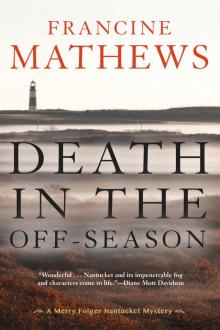 Death in the Off-Season
Death in the Off-Season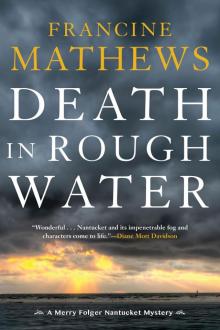 Death in Rough Water
Death in Rough Water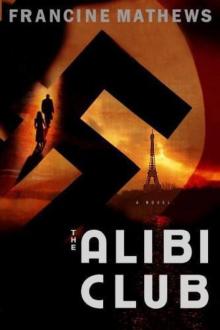 The Alibi Club
The Alibi Club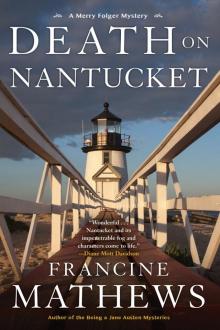 Death of a Wharf Rat
Death of a Wharf Rat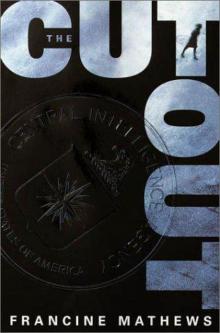 The Cutout
The Cutout The Secret Agent
The Secret Agent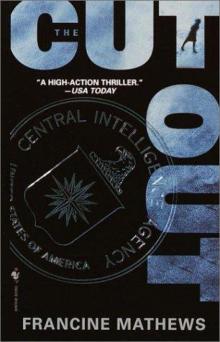 The Cutout cc-1
The Cutout cc-1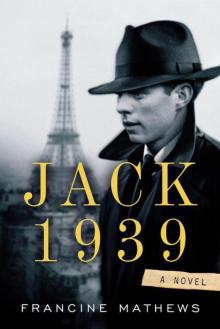 Jack 1939
Jack 1939 Death in a Cold Hard Light
Death in a Cold Hard Light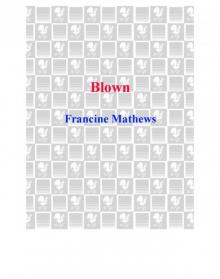 Blown
Blown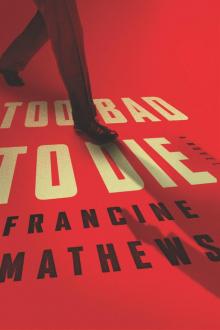 Too Bad to Die
Too Bad to Die